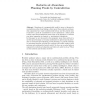Free Online Productivity Tools
i2Speak
i2Symbol
i2OCR
iTex2Img
iWeb2Print
iWeb2Shot
i2Type
iPdf2Split
iPdf2Merge
i2Bopomofo
i2Arabic
i2Style
i2Image
i2PDF
iLatex2Rtf
Sci2ools
109
click to vote
BIRTHDAY
2006
Springer
2006
Springer
Reductio ad Absurdum: Planning Proofs by Contradiction
Sometimes it is pragmatically useful to prove a theorem by contradiction rather than finding a direct proof. Some reductio ad absurdum arguments have made mathematical history and the general issue if and how a proof by contradiction can be replaced by a direct proof touches upon deep foundational issues such as the legitimacy of tertium non datur arguments in classical vs. intuitionistic foundations. In this paper we are interested in the pragmatic issue when and how to use this proof strategy in everyday mathematics in general and in particular in automated proof planning. Proof planning is a general technique in automated theorem proving that captures and makes explicit proof patterns and mathematical search control. So, how can we proof plan an argument by reductio ad absurdum and when is it useful to do so? What are the methods and decision involved?
| Added | 20 Aug 2010 |
| Updated | 20 Aug 2010 |
| Type | Conference |
| Year | 2006 |
| Where | BIRTHDAY |
| Authors | Erica Melis, Martin Pollet, Jörg H. Siekmann |
Comments (0)

